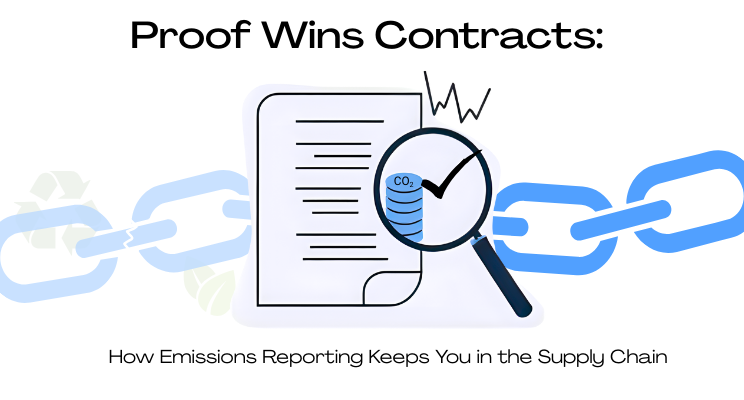Why Customers and Partners are Increasingly Swayed by Transparency and Emissions Accountability
Winning work today isn't just about price or product. It's about proof.
More than ever, contractors and sub-contractors are asking: does this partner align with our sustainability goals?
More often than not, the answer comes down to emissions reporting. It's no longer a "nice to have" or a compliance tick box. It's becoming the deciding factor in whether you win tenders, secure contracts, and stay part of the supply chain.
Contractors Want Proof, not Promises
The Australian market is becoming more climate-conscious, and businesses are following suit.
When contractors select their sub-contracting partners, they want evidence that their partners share their values and can back it up with the results and data. Saying "we're committed to sustainability" isn't enough anymore. Decision-makers want something they can verify.
Emissions reporting provides that evidence. It shows accountability, highlights progress and signals your business is prepared for the future. By contrast, a lack of reporting can raise doubts, even if unintentionally, that a business is lagging behind or hiding inefficiencies. In an age of greenwashing, data speaks louder than promises.
Supply Chain Pressures are Upwards and Onwards
Larger contractors are under growing pressure to measure and report their supply chain emissions (Scope 3).
That means if you're a sub-contractor providing goods or services to a major contractor, you'll be asked to share your emissions data for their jobs. This shift is no longer a "maybe one day". We've already seen customers asking for emissions reporting from their fuel statements. It's happening across tender documents, procurement processes and supply contracts.
For some, being unable to provide emissions data could put contracts at risk. For others, proactive reporting becomes a powerful differentiator. It makes it easier to stand out, win tenders, and lock in long-term partnerships
Sub-contractors who can demonstrate emissions transparency now are positioning themselves as the same and future-ready choice.
Governments & Councils Setting the Standard
The public sector isn't sitting still either. Federal entities are already reporting their emissions, with local governments also taking the step towards industry leadership.
The City of Sydney is a powerful example of this. It became Australia's first carbon-neutral council back in 2008, well before it was standard practice. Since then, it has cut building efficiency, and investing in sustainable transport. These efforts have not only reduced emissions - they've also saved millions in energy costs and positioned the city as a trusted leader in sustainability.
The lesson? Councils that moved early into emissions accountability are now reaping both environmental and financial rewards. And for sub-contractors, the signal is clear: if councils like Sydney are embedding emissions reporting into their own operations, they'll expect the same level of transparency from the businesses they engage.
Your Best Practices for Getting Started
- Measure what you can today. Even if it’s just fuel and electricity, start building a baseline.
- Use established frameworks such as the GHG Protocol or Australian Sustainability Reporting Standards (ASRS).
- Leverage digital tools. Platforms like Nuonic can help automate data collection and reduce admin.
- Seek third-party validation. Audits and certifications build trust and reduce reputational risk.
- Report transparently. Even if your data isn’t perfect, sharing openly builds credibility.
Emissions reporting isn't just compliance. It's your competitive advantage.
It helps contractors and sub-contractors build trust, secure supply chain relationships, attract investment and demonstrate leadership in a market where climate accountability is fast becoming the norm.
The City of Sydney proved years ago that transparency and decisive action deliver both environmental and financial returns. Now businesses of all sizes have the same opportunity: Measure, Manage, and Report your emissions and set yourself up not just to win contracts, but keep them.
